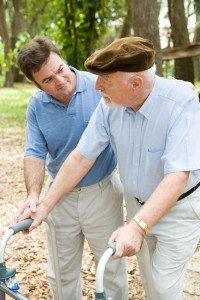Summertime and Senior Care in Garden Oaks TX- Keep an Eye on the Elderly in the Summer Heat
Just as the severe cold temperatures are dangerous for the elderly in the winter, the high temperatures of summer can be equally or more dangerous. Seniors are more prone to the effects of heat and at greater risk for dehydration.
According to the CDC, elderly people are more at risk for the following reasons:
- Seniors’ bodies do not adjust as well as young people to sudden changes in temperature.
- They are more likely to have a chronic medical condition that changes normal body responses to heat.
- They are more likely to take prescription medicines that impair the body’s ability to regulate its temperature or that inhibit perspiration.
It is important during this time of year that someone you trust is checking on senior loved ones who live alone. If you can’t be there, consider hiring a home care agency to visit a couple of times a week to assist with errands, light housekeeping, laundry, and general senior care. It’s always good to have a set of eyes and ears that can report anything unusual to the family.
Here are some tips on “beating the heat” with regard to senior care.
- Try to plan activities that require going outside during cooler hours.
- Move exercise indoors. Consider exercising at a gym, walking on a treadmill, or “mall walking” instead of outdoor walks or activities. Swimming and water aerobics are good options as well.
- Drink plenty of fluids (non-alcoholic, caffeine-free as these ingredients have a diuretic effect). Talk with your doctor if you take medications that affect fluid intake, such as Lasix or a “water pill”.
- Stay indoors in cooled spaces as much as possible. Check on senior’s air conditioning system, do a maintenance review. If electricity goes out or your loved one does not have air conditioning, consider alternative arrangements when heat is at dangerous levels.
- Be aware of signs of dehydration, heat exhaustion and heat stroke.
The most common signs of dehydration in the elderly are thirst, confusion, irritability and poor skin elasticity. Keeping hydrated on a regular basis is the most important preventative measure, and individuals should be encourage to drink fluids even when not thirsty as thirst may not be triggered until already dehydrated. Heat and dehydration may make seniors more prone to dizziness and falls and can cause/increase confusion.
Heat exhaustion is the more mild form of heat-related illness that can develop after several days of exposure to high temperatures and inadequate or unbalanced replacement of fluids.
Warning signs of heat exhaustion in seniors vary but may include the following:
- Heavy sweating
- Paleness
- Muscle Cramps
- Tiredness
- Weakness
- Dizziness
- Headache
- Nausea or vomiting
- Fainting
- Skin: may be cool and moist
- Pulse rate: fast and weak
- Breathing: fast and shallow
Heat stroke is the most serious heat-related illness. It occurs when the body becomes unable to control its temperature: the body’s temperature rises rapidly, the body loses its ability to sweat, and it is unable to cool down. Body temperatures rise to 106°F or higher within 10 to 15 minutes. Heat stroke can cause death or permanent disability if emergency treatment is not provided.
Warning signs of heat stroke in seniors vary but may include the following:
- An extremely high body temperature (above 103°F)
- Red, hot, and dry skin (no sweating)
- Rapid, strong pulse
- Throbbing headache
For more information about senior care options for your loved one in the Garden Oaks area contact At Your Side Home Care at 832-271-1600.
Our Certified Nurse Aides, 24-Hour Live-in Assistants and Home Health Aides are available 24 hours a day, 365 days a year. We also provide the security and confidence of 24-hour Telephone Assistance, so fast, reliable help is always available when it's needed. To learn more about our homecare services see our homecare services page.
Different people need different levels of homecare. To meet the requirements of our clients, At Your Side Homecare maintains consistent staffing levels of caring professionals. Homecare service is available for as little as a few hours a week, or as many as 24 hours a day, seven days a week
- What Solutions Can Help Seniors with Mental Health Challenges? - April 18, 2025
- How Does Senior Home Care Help Make Aging in Place Possible? - April 11, 2025
- Best Balance Exercises for Seniors - April 4, 2025



